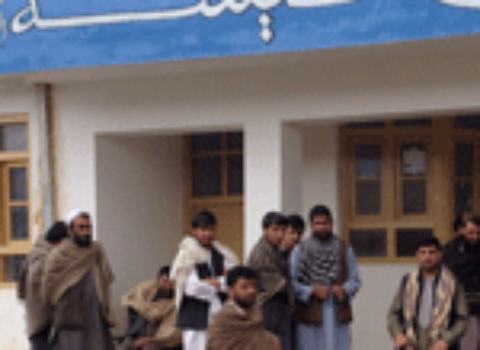Last Wednesday, nearly 200 tribal elders and other notables from Kandahar Province convened in the Roshan Plaza in downtown Kabul. The group was a who’s who of pro-government figures, among them Agha Lalai Dastegiri, Fazluddin Agha, and Bacha Sherzai, brother of former governor Gul Agha. They had gathered to petition President Hamid Karzai to appoint his brother Ahmed Wali Karzai as the next governor of the province. (The current leader, Afghan-Canadian Tooryalai Wesa, is widely reputed to be looking for a way out of his job.) The meeting was part of a week-long junket, and according to several people who attended, the cost, which would have been as high as several hundred thousand dollars, was paid by Ahmed Wali Karzai himself.
Matthieu Aikins is a freelance journalist living in Kabul. He has written for Harper’s Magazine on drug-trafficking Afghan border police and fraud in Afghanistan’s parliamentary elections. You can follow him on Twitter.
Within the larger Wednesday gathering, a smaller group of key leaders assembled. The man chairing the discussion, an important religious leader, solicited reasons they might offer the president for appointing his brother. Those present duly responded that Ahmed Wali is wise and generous, and has good relations with the tribes. Mohammed Naeem Lalai, a young, uneducated member of Afghanistan’s parliament, drew scattered laughs when he said, “If they say the president’s family should not be governor, I say look at Libya, where Qadhafi’s sons are working with him, or look at Saudi Arabia, where King Abdullah’s family are in important positions.”
“Stop right there,” the religious leader said, aghast. “There will surely be Americans present when we explain this to the president. We should only use examples from democracies.”
Finally, the group turned to Bacha Sherzai, the brother of Gul Agha Sherzai, Ahmed Wali’s foremost rival in Kandahar.
“Well Bacha, you haven’t said anything yet. Why don’t you tell us your reason why the president should appoint Ahmed Wali as governor?”
Bacha made a sour face and thought for a moment. Then he said: “Well, whenever I go to Governor Wesa to ask him for something, he says yes, but it never ends up happening because Ahmed Wali is opposed. At least if Ahmed Wali is governor he will have to tell me no to my face.”
The campaign to make Ahmed Wali governor of southern Afghanistan’s most important province has become a topic of earnest discussion in Kabul policy circles since that meeting. Yet from what I’ve heard, the reaction has been relatively muted among diplomats and senior military officers, aside from some apprehension over how such an appointment might play in the press. The sentiment seems to be that since Ahmed Wali is already the de facto governor, actually giving him the job might make him more accountable.
Such a development would bring to an inauspicious close the long-running debate about what to do with a problem like Ahmed Wali. In the past three years, the president’s brother has been accused (mostly by American sources cited in the New York Times) of being involved in the heroin trade and of being paid by the CIA to run illegal militias. He also has close ties to Akhtar Mohammad and Ruhollah, the muscle behind the notorious convoy operations of Watan Risk Management, a now-blacklisted entity whose problematic links with insurgents were detailed in the congressional Host Nations Trucking Report.
So what to do with Ahmed Wali? Pressure Hamid to move him out of Kandahar? Put him on the JPEL “kill/capture” list? Work with him, in the hope that he’ll mend his ways? Or marginalize him by building “capacity” around the office of the current governor, Tooryalai Wesa?
1 I had the pleasure of hearing some myself last July, from Abdullah Sharif (a.k.a. the Governor Whisperer), then head of the State Department’s political section at the Kandahar Provincial Reconstruction Team. My word-for-word transcription:
MA: I’m interested in this point because we both know Ahmed Wali Karzai is the most important person in this town in terms of his influence, both perceived and—
AS: Yeah, I mean I’ve heard the same things, but I’ve not seen anything, you know, I don’t have any evidence of it. But that’s what people say.
MA: You don’t think there’s evidence of it?
AS: I’ve not seen any evidence of it. Not myself. I’ve heard that he’s a very powerful person, and so forth, but I’ve not seen him exerting influence on our work or anything like that.
And so on.
This last option has long been regarded as the most politically palatable choice, and it was the primary talking point of the various officials rotating in and out of Kandahar in the aftermath of the embarrassing allegations against Ahmed Wali. The capacity-building option was also the most patently absurd one, however, given that Wesa was a powerless technocrat from British Columbia with links to the Karzai family that dated to his childhood. The notion that Wesa was becoming independent from Ahmed Wali was precisely the kind of nonsense U.S. and Canadian diplomats have been feeding to journalists for the past two years.1
What actually happened is that senior U.S. military commanders decided to work with Ahmed Wali, particularly on provincial and district appointments that would bolster security and reintegrate insurgents. The decision effectively allowed Ahmed Wali to consolidate his power base in the province. A number of officials close to Gul Agha Sherzai, his principal rival, have since been pushed out of the governor’s office, while allies like Abdul Raziq, the new police chief of Kandahar, whom I wrote about in the December 2009 issue of Harper’s, have been appointed to prominent positions.
On Monday, the entire delegation of Kandaharis went to the presidential palace to discuss their petition with Hamid Karzai over lunch. The president’s approval was not a given: his relationship with his younger brother is sometimes uneasy, and it has been marked by Hamid’s reluctance to bring Ahmed Wali further into the spotlight. And indeed, the president argued against the appointment, saying that it would compromise his brother’s ability to act as a “tribal elder,” and that “only the enemy of Ahmed Wali would want to make him governor.”
2 For example, since coming in at his behest last summer as governor of Panjwai District, Fazluddin Agha, a respected Syed figure close to Ahmed Wali, has brought in a couple of mid-level Taliban commanders.
These kinds of meetings are commonplace in Afghanistan, but the size and timing of this one — it took place during a meeting of the International Contact Group, which brought a number of important diplomats to town — suggest that it was meant to make a statement. The Karzais could now be waiting to see if anyone objects to the proposed appointment. It’s quite possible Western military forces and diplomats won’t oppose it. They’ve increasingly come to see Ahmed Wali as a powerful actor, capable of brokering deals with “reintegrating” Taliban thanks to his murky connections in the province.2
Of course, the apparent push to make Ahmed Wali governor could just be part of some inscrutable game between the president, his brother, and the internationals. We may have to wait until the resolution of the country’s parliamentary crisis to find out, particularly since Wesa is said to have hopes of being part of Hamid Karzai’s next cabinet. But the prospect of Ahmed Wali becoming governor and the mild reaction the notion has provoked say something about vanishing pretensions on both sides, as the United States tries to forge a stable political order that can outlast its withdrawal.





